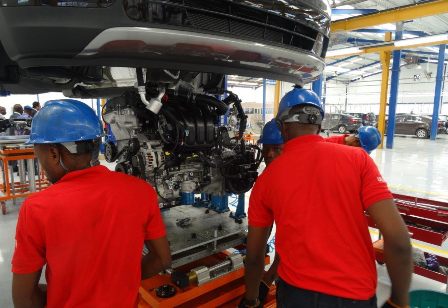JIMOH OLAWALE
[dropcap]T[/dropcap]he current wave in the economy has continued to dampen the spirit of industrialists and makes the policy makers intensify their efforts in ameliorating the economic condition. In an expected reaction from the economic instability, harried auto makers and some stakeholders in the country remain perturbed as economic growth declines and consumer buying power dips to a record low.

As an advocate of the policy and a major stakeholder in the industrialization of the economy, Kia Motors Nigeria has continued to produce made in Nigeria cars from its plant in Lagos. With a capacity to produce 27,000 cars per annum, it’s evident that Kia Motors Nigeria is committed to meeting the local demands.
On the heels of the establishments of assembly plants, Kia Motors Nigeria localized the production of its cars in the country. In a move that’s reassuring and in consonance to the policy framework by the National Automotive Design and Development Council (NADDC), Kia has remained committed to making Nigeria a manufacturing hub of automobiles in sub-Saharan Africa. The present economic challenges can be daunting, but the company remains undeterred and committed to strengthening the nation’s economy through the automobile industry. Since the inception of its plant’s operations, all Kia cars are produced locally and are manufactured to the exact standard of the brand’s global quality.
Kia’s footprint in the country cannot be overemphasized, with showrooms spread across the states in all the regions of the nation, the company has taken its cars to the hinterlands, bringing it closer to teeming customers. Equally important, Kia’s after-sales service centres remain one of the best in the industry with its exceptional service deliveries to the customers thereby making the Kia model range of cars a preferred automobile brand in the country.
There is no gainsaying the fact that Nigeria’s automobile industry is one of the worst hit sectors in the current downturn as the nation’s economy is at its lowest ebb. However, a return to the hitherto influx of imported used cars will recline the trajectory growth of the industry. Reeling some appreciable gains for the past three years, the auto policy by the NADDC has led to the setting up of auto assembly plants to supply the vehicular requirements of the nation, an initiative many applauded as a move towards economic industrialization.
Typical of every developmental policy across the globe, there is always a teething period prior to the realization of its full gains. The current Nigerian auto policy can be likened to the teething period. However, with a concerted effort by the government and unalloyed support from the stakeholders, the policy will help advance the economy and increase the GDP of the country.
At this phase of the industry development, it’s apparently evident that the auto assembly plants in the country, particularly Kia have the capacity to meet the demands of the Nigerian market. Having locally produced the newly launched 2017/18 KIA Sportage, Optima and Sorento amongst others, the made-in-Nigeria KIA cars will continue to remain a catalyst for nation’s automotive development.
Jimoh Olawale is the Marketing Manager, Kia Motors, Nigeria




